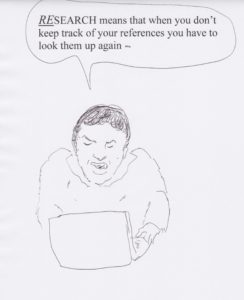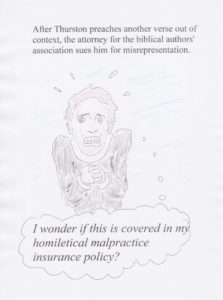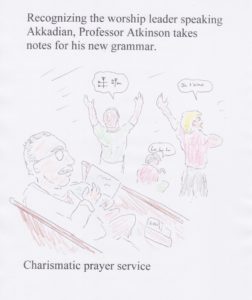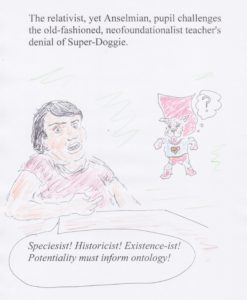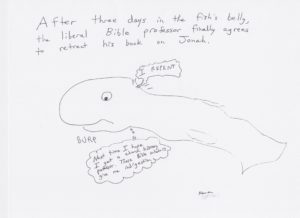New cartoonist
Homiletical malpractice
Sorry to have more cartoons than Bible studies on this page, but they take less time to write! (If you run out of things to read, though, there’s a huge number of Bible studies in the archives pulldown [“posts by books of the Bible or topic”] on my home page.) But once in awhile even the cartoons have a message …
Matthew course session 4 (free video)
Introduction to Matthew; Matthew 1
Akkadian charismatic grammar
Cultural Backgrounds Study Bible interview
Michael Brown interviews Craig Keener about his new books, especially the Cultural Backgrounds Study Bible:
Nonspeculative redactional analysis
Recently, in 2311, archaeologists discovered this ancient letter from the early 21st century. Happily, our ingenious biblical scholars have been able to isolate the various redactional layers of this letter.
| Jan. 14, 2018
Dear Harry, { This name is currently unattested in the 21st century and should be understood allegorically with reference to the recipient’s hair length}
I regret {inconsistent with the narratorial voice, this was added by the 2nd redactor} that we cannot {polite addition by 2nd redactor} grant your requested extension {21st-century writers applied “extension” to added fake hair, obviously the original subject of this correspondence}. You should be aware {3rd redactional layer} that you should apply {allusion to a hair-cutting appliance} for extensions before the deadline {note etymological root “dead,” subtly threatening penalties if hair is not cut}, as clearly {3rd redactor, wrongly thinking hair color at issue} specified both in the syllabus and in the student handbook {2nd redactor; no original author would include two prepositional phrases}. If I may step aside from the usual professional language for a moment, applying for an extension six weeks after the close of the semester is irresponsible behavior characteristic only of immature, preadolescent {2nd redactor, who thinks the recipient too young to grow hair}, whining brats. Are you aware that our institution {3rd redactor envisions here a barbershop} provides basic counseling services at no cost to the student? I strongly encourage you to take advantage of this opportunity, and also, if your counselor so advises, to check yourself into a psychiatric institution. {3rd redactor, wrongly thinking barber scissors cause brain damage} Sincerely, Your Advisor {3rd redactor, alluding to helmet visors, which can prevent brain damage}
|
Life is the Pits
Thrown into a pit by his brothers—Genesis 37:18-24
How did Joseph’s have time to plot against him once they realized that he was approaching them (37:18-20)? Joseph’s brothers saw him from far away and (37:18); he was coming across a level area and his special coat reaching to the feet (37:3, 23) made his identity conspicuous. For narrative purposes, it may sound as if all of Joseph’s brothers conspired against him (37:19), but that the narrator explicitly excludes Reuben, who is not part of the conversation but overhears (37:21), suggests that the narrator might be emphasizing the participation of all more than did any more detailed story he may have been condensing. Reuben was not with these brothers all the time (37:29-30); probably some brothers had been watching flocks that were spread out.
Ironically, the hostile brothers’ plan to throw Joseph into a pit and then “see what will become of his dreams” (37:20) ultimately serves God’s plan to bring fulfillment to those very dreams (50:20). That Reuben, now perhaps about twenty-four years old, seeks to protect Joseph (37:21), probably reflects him being older and more mature than his siblings. Still, Joseph’s other brothers are not young adolescents. Most are probably in their twenties; only Benjamin was younger than he (30:23-24). (Joseph was probably six when they entered Canaan, and Reuben thirteen; see 30:25-26; 31:41.) Reuben might also hope to win back some of his father’s favor by delivering Joseph safely to him, acting more faithfully than his younger brothers (37:22).
When Joseph arrived, suspecting nothing, his brothers tore his special robe from him (37:23). As is typical for victims of stress, this scene probably reenacted itself repeatedly in Joseph’s mind in months to come. Not only in Joseph’s mind, however, but in his actual experience of life, God will allow subsequent scenes to again evoke this one. Potiphar’s wife later seizes his garment (39:12-13); by contrast, when God exalts Joseph, Pharaoh provides him the best garments (41:42).
And these are only the scenes that Joseph experiences directly. When Jacob sees his beloved son’s torn robe, he tears his own clothes in mourning (37:34; cf. also Reuben in 37:29), as do his sons later when they suppose that slavery awaits Benjamin (44:13). That is, Joseph’s suffering brings grief to his father, and the fear of Benjamin’s suffering and their father’s further grief grieves his brothers. They have long regretted their hasty and hate-filled choice to betray a brother. Yet in Joseph’s forgiveness he later gives each of them changes of clothes (45:22). (Recall that earlier in Genesis God also showed his mercy by making tunics for Adam and his wife, after their fall into sin, in 3:21.)
After ripping off his garment, Joseph’s brothers hurl him into a pit (Gen 37:22-29). This circumstance, too, Joseph would face again; the same Hebrew term also appears more than once for the prison house where he was thrown after being falsely accused by Potiphar’s wife (40:15; 41:14). The Psalmist often praised God for not letting him perish in the pit, sometimes a metaphor in the Psalms for death (Ps 28:1; 30:3; 40:2; 88:4, 6; 143:7).
The narrator might mention that the pit into which Joseph’s brothers threw him lacked water (Gen 37:24) to note that he would not drown there (cf. Jer 38:6), but more likely he narrates this lack of water to suggest that he would die of thirst if left there. (The text might also qualify this because the Hebrew term used here could also refer to a cistern or sometimes to a well; the text thus specifies that no water is involved in this case.) They threw him into a pit in the “wilderness,” presumably so that he would die there without his brothers having to directly shed his blood (Gen 37:22).
The callousness of his brothers is underlined by their activity after stripping him and throwing him into the waterless wilderness pit: they sat down to eat bread (37:25). All this while Joseph was certainly crying out, pleading with them, but they refused to listen (42:21). Eating bread together was an act of bonding and unity (14:18; 18:5; 31:54), though it also was the context of their father’s betrayal of his brother (25:34; 27:17). More ironically still, their survival will someday depend on bread supplied by Joseph himself (41:54-55; 47:12).
We cannot possibly imagine how God could build his chosen people from these brothers, later forgiven by Joseph, without understanding that God is a God of grace. He forgives the guilty and changes them. Their story is also our story, because all of us need forgiveness. And just as Joseph’s forgiveness was a costly act, so it cost God much to forgive those who offended against him so deeply by how we have treated lightly his own Son’s sacrifice for us. Yet because of that sacrifice, his forgiveness is free to all who ask him.

